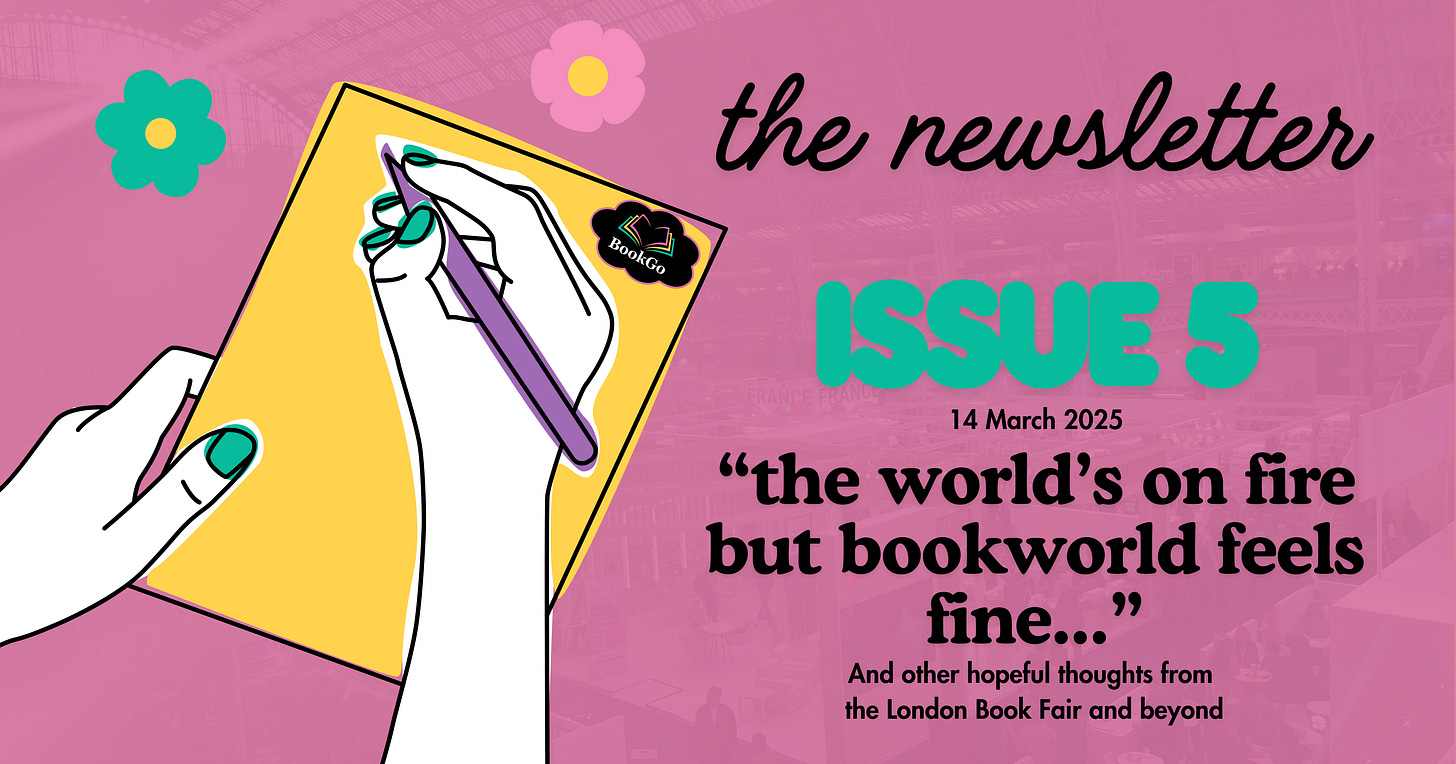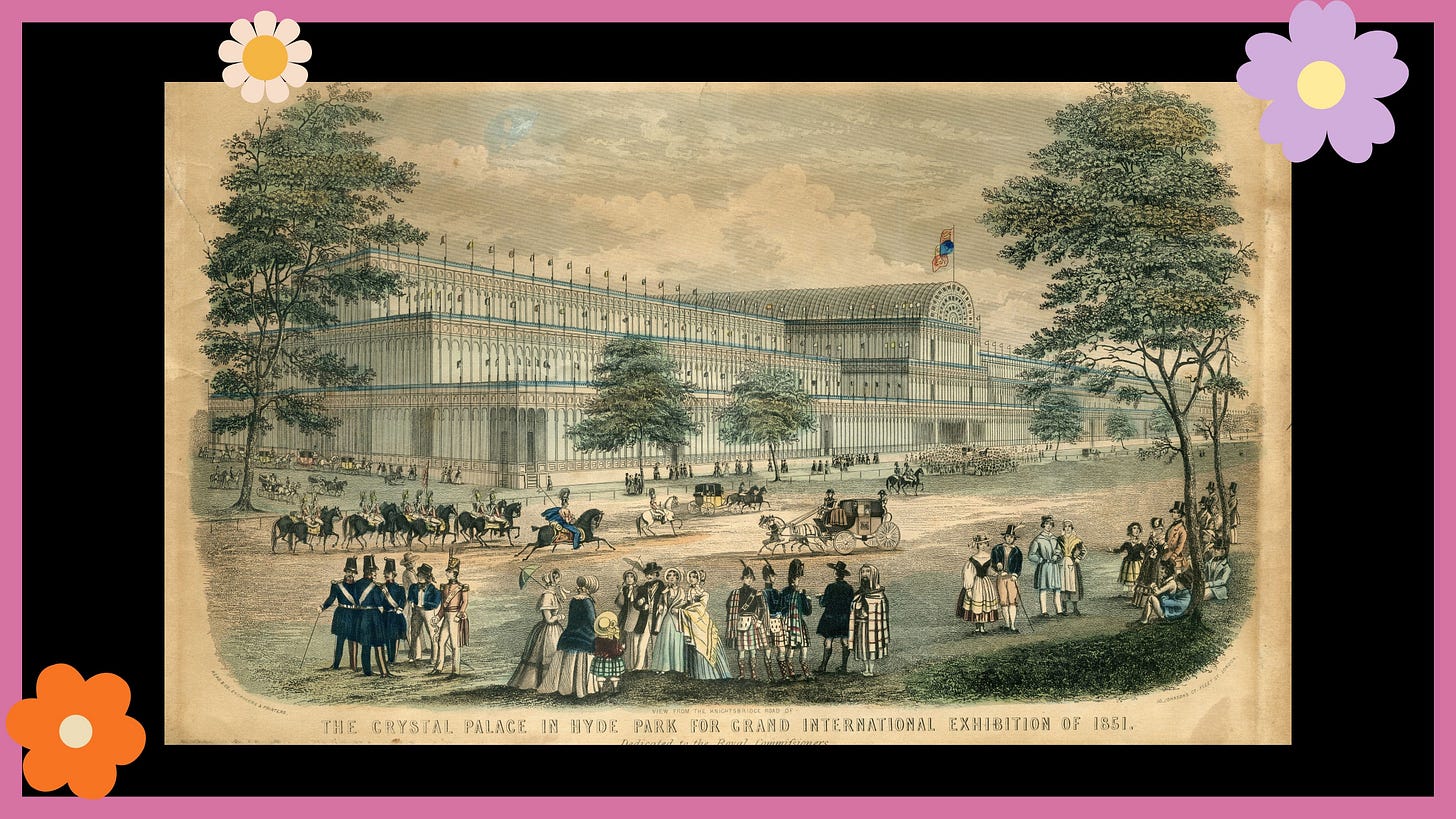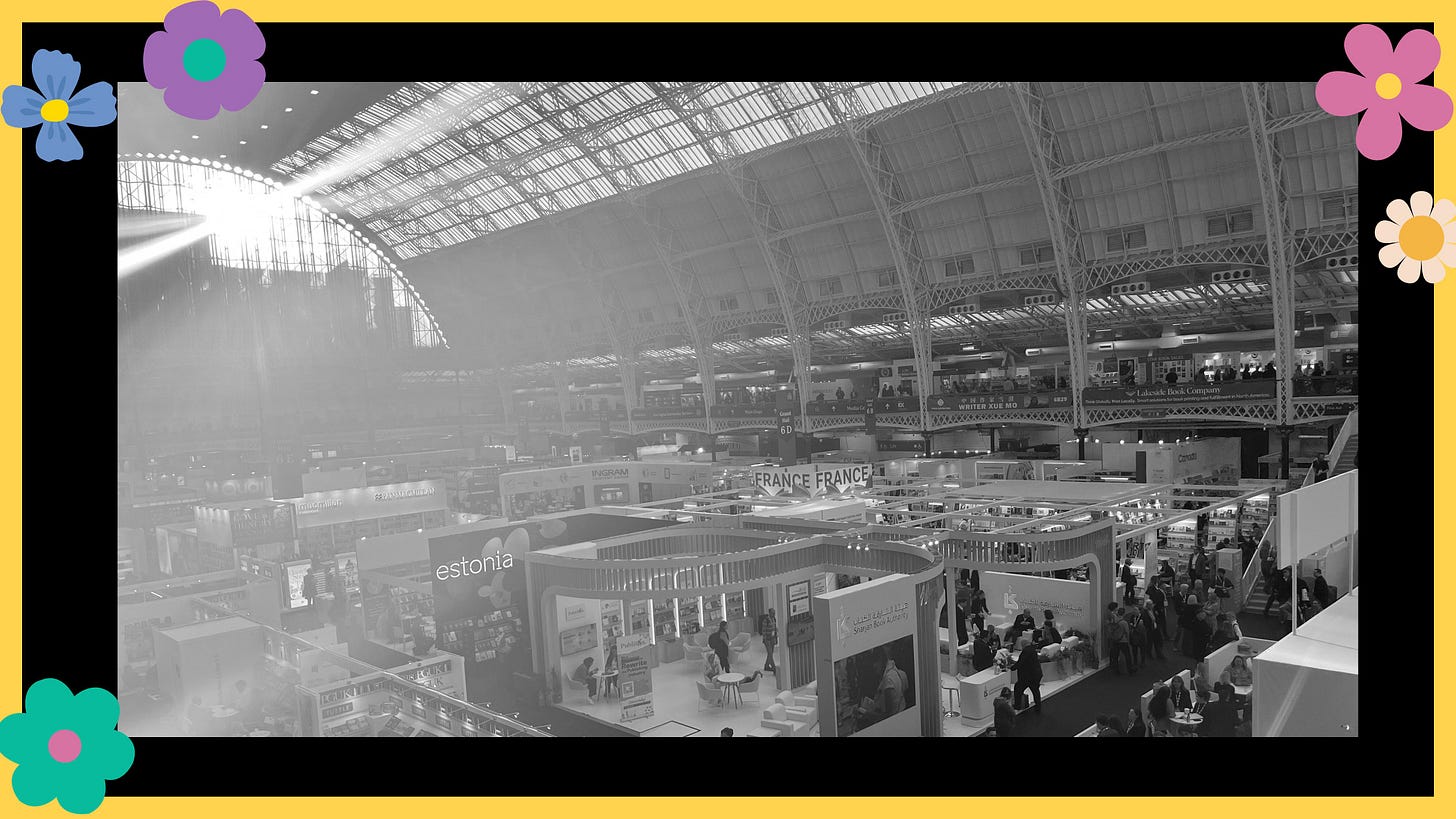BookGo Issue #5: “The world’s on fire, but bookworld feels fine...” And other hopeful thoughts from the London Book Fair and beyond! 🔥
The London Book Fair lo-down | Balancing writing and childcare | Celebrating self-publishing | More poems by BookGo women writers | And everything we’re reading, watching, and sipping this weekend ✨
Happy Friday one and all!
We’re just about midway through March, and that means that as well as continuing to celebrate Women’s History Month, we’ve also been revelling in one of the biggest events in the publishing calendar this week: the London Book Fair. Here’s what’s in store.
First up, Tom reports back from the London Book Fair with the latest trends and opportunities in the world of publishing, and he’s thrown in some uplifting reflections as well – it turns out when you get to see all the amazing things happening in book world, you can’t help but feel like even the real world might be alright in the end…! 🤞
Next, Michael’s also got some words of hope in his Agony of Genius column, for anyone who’s ever doubted the power of self-publishing. If you’ve been told that self-publishing isn’t for serious writers or will never get you anywhere, then Michael encourages you to take a leaf out of any one of Irish writer Siobhan Davis’ self-published books – because there are literally millions of them: bestselling romance books of every shape and size. As Michael reminds us, the only thing that matters is the story – so find whatever way you can to tell it!
P.S. this also fits in with another theme of the week, which is Irish writers, in preparation for St Patrick’s Day celebrations on Monday 17th March – and maybe a few warm-up celebrations over the weekend… ☘️
Next up, in our FreeReads section, we’ve got more poems from wonderful BookGo women writers. We’re sticking with uplifting thoughts for gloomy Spring days, since both these poems explore, in different ways, the hope and beauty we hang on to in the dark. First, the amazing YA poet and teacher Sarah Fymme gives us a beautiful picture of the “brightnight” and “nightbright” sky in “Wintersky.” And then poet and music artist Sharon Israel offers a journey through misty memories of life on the Hudson river in “Fog Hides a Red House.” 💌
Sharon’s poem also shares its New York setting with one of Tom’s picks for Watch One 📺, Read One 📖, Sip One 🍸 . You’ll have to read on to find out what it is, but since Tom’s also celebrating the work of Irish women this weekend, maybe that gives you a clue… 🇮🇪👭
And then, for our paid subscribers, our resident life-support guru Rita “Make-it-Write” is back with more tips and tricks for navigating all your writerly trials and tribulations. This week Rita answers a question from a new mom trying to manage the challenges of childcare while also keeping up her writing. As always, it’s Rita to the rescue with some sound advice for parents everywhere.
Let’s get BookGoing! 🌻
Hello from the London Book Fair! 📚🖋️🎉
By Tom Elliott
It’s an exciting week in the literary calendar as the London Book Fair has been in town at the Victorian-era exhibition centre, Kensington Olympia. The fair covers everything from writing to publishing, editing, distributing, audiobooking, podcasting, and more, so this week I’ve been scoping out all the latest trends in book world.
And my, what a world it is! My overwhelming impression of the fair is that it is staggering in its international scope. Though the big five English-language publishers had big-five-style stands taking up much of the exhibition floor, they were dwarfed by the collective gathering of other international publishers from around the globe. I browsed stands and chatted with traders from China, South Korea, France, Spain, Turkey, Ukraine, and more. And these publishers, editors, and agents were not just selling and looking out for books by authors in their respective home languages (though that’s great to see), they were also exploring and showcasing the demand for English-language books abroad. Just like us, stories long to travel, and I felt encouraged to widen my gaze beyond the English and American markets.
In fact, with all the world under one glass roof, I almost felt transported back to the global fairs that London once hosted in its remarkable Crystal Palace. The only difference today is the ever-growing scope for connectivity in our increasingly multi-polar world.
I was also reminded of just how important the ideal of “world literature” remains, particularly in our era of geopolitical tension, hostile isolationism, and resurgent nationalism. It was the great German author and polymath Johann Wolfgang von Goethe who in the early nineteenth century saw the notion of “world literature” (Weltliteratur) as an essential ingredient for fostering a “more humane spirit” and ensuring that “conflict will decrease, war become less cruel and victory less arrogant.”
“It is obvious that for a considerable time the efforts of the best writers and authors of aesthetic worth in all nations have been directed to what is common to all mankind. In every field, whether the historical, the mythological, the fabulous, or the consciously imagined, one can see, behind what is national and personal, this universal quality becoming more and more apparent. In our daily lives, too, some similar principle exists, breaking through the world’s harshness, deceit, and selfishness, everywhere seeking to foster a more humane spirit, and although it can hardly be hoped that universal peace will be achieved by this means we may trust that conflict will decrease, war become less cruel and victory less arrogant.”
~ Johann Wolfgang von Goethe
With Goethe’s words on world literature echoing in my head, exploring the London Book Fair and talking with passionate publishers from around the globe basically gave me the sense that: even if the world’s on fire, book world feels fine! So in book world we trust!
And even if that world was brought together under a nineteenth-century glass roof this week, it was certainly not stuck in some distant past. The pace of the contemporary publishing industry was clear to see. From companies offering global book distribution powered by AI insights to software developers pioneering all-new digital platforms for consuming literature in written and audio form – the publishing industry clearly has its eyes on the future. As you can imagine, AI shadowed the conversations like Banquo’s ghost, but many of the seminars I attended on the subject kept reminding us that these technologies only help us to explore more fully what it is that makes us human. Publishing has a long history of being at the forefront of technological revolutions, from the development of mass printing with the Gutenberg press to the online transformations of today, so we’re ready to react and be at the forefront of the transformations happening today.
And that brings me to the final takeaway from the London Book Fair, which is that leaving political, technological, and social changes aside, what always remains is a relentless, voracious, universal appetite for reading, reading, reading. Nowhere was this more evident than in the seemingly insatiable desire for children’s literature on display. While worries certainly abound about the next generation of screen babies, the London Book Fair makes it clear that children love literature as much as they ever did. They want to visit transformative fictional worlds; they want to explore inspirational non-fiction; they even want access to the great classics of world literature retold in new forms for a new generation.
So the moral of the story is, if the real world ever gets you down, take a trip to book world instead. You’ll find conversations across international borders and visions of bright futures for our children. That world was in full flow under one roof in London this week, but remember that it’s always there in the background, invisible behind the real world, keeping us going, and making it all worth it in the end!
— Tom
🆓📚🎉 BookGo FreeReads 🆓📚🎉
In BookGo FreeReads, we feature excerpts and full works from BookGo’s wider network of family and friends.
Wintersky
By Sarah Fymme
High above in airy sky
While evening says a quick goodbye
Then begins an azure end of light
Before it blues to inky night
It is then
When carlights wake like night’s black beast
When headsdown dads and moms retreat
When we the weary find our homes
When houses snap out darkened domes
When sunset still pinks up the west
To sweeten treetops and dark the rest
And now
Comes the nightsky that I love
And now
An impossible blue sighs up above
Over my shadow world below
We envy this brightnight daring
While eastern skies wink waking stars
This darkly twinkly nightbright blue has caught my daylong gleams
To meet the colors of my dreams
Sarah Fymme is a New York City-based teacher, writer and YA poet: Sara is deaf and a member of the Deaf Poet’s Society. Her work has been published in Private Press.
Fog Hides a Red House
By Sharon Israel
Fog hides a red house balanced on one rock, jutting up from the Hudson. Clapboards, windows appear and disappear. A big fog can cover a city. Now it hides a buoy. I can still hear its bell. The bell has no shape inside the fog. The house has no shape inside the fog, but I can hear someone inside playing the piano, someone singing in the kitchen. As the fog lifts I see two rowboats suspended from grey rope. They sway over the river. A wisp of fog could fill a dollhouse vase, could flood a tiny staircase. But this house is real. I see it as the fog clears. First the red clapboards, then the white windows, the grey roof last. If I look through the window will I see my mother’s crumbling photo on the piano? I can stop watching now. I’ll move back from the shore, careful of slippery rocks.
Sharon Israel hosts the radio show/podcast, Planet Poet-Words in Space. Her chapbook Voice Lesson was published by Post Traumatic Press (2017). Sharon’s work most recently appeared in Loud Coffee Press. She is a member of the sound/poetry duo OrphicMix with composer Robert Cucinotta.
The Agony of Genius: Siobhan Davis vs Bill Bryson
By Michael McKinley
So the esteemed writer Bill Bryson thinks too many people are self-publishing these days. I have enjoyed Bryson’s books, especially Notes From a Small Island, and Among the Thugs. Whoops, that latter book was by Bill Buford. My point, however, is that if Bryon’s argument is that there are too many books out there, my counter would be it’s hard to keep track of titans like Bryson and Buford who are not self-publishing. I don’t think you can ever have too many books, because you never know what story is coming up next.
Bryson’s view is that it’s fine to self-publish a book for your family, but don’t put it out there in the world beyond the domestic hearth. To me, this is a little like saying “publish your book but don’t let too many people read it.” Which comes back to the issue that all writers face, and that is once your book (self-published or “traditionally” published) is on the shelves, either the bricks and mortar kind, or the ethereal kind at www.bookshop.org, every writer faces the same challenge: generating word of mouth, which translates into readers, and sales, and royalties, and the next book and so on.
If you don’t publish because Bill Bryson thinks you shouldn’t, then this is one more type of literary rejection that is as annoying as it is risible. If you have a story that you want to tell, and given the reality of publishing these days, then self-publish and do not be damned! It’s what Siobhan Davis, an Irishwoman who has sold more than two million copies of her self-published romance novels, decided to do when she turned 40 and quit her job. She wrote and people read, and really, that’s the equation you need to care most about: we can’t read you if you don’t write. So if you have a story, focus on telling it, and getting it out there. You never know what will happen next. Bill Bryson might even read it.
– Michael
Watch One 📺, Read One 📖, Sip One 🥃
By Tom Elliott
Hello one and all. I’m looking a little bit further ahead than the weekend this Friday in anticipation of some celebrations that might be stirring in Dublin and further afield. With St Patrick’s Day on the horizon this coming Monday and still in the middle of Women’s History Month, I couldn’t look much beyond some of the incredible cinematic, literary, and liquid achievements of the women of Ireland!
📺 One to watch: Brooklyn, directed by John Crowley (2015)
When it comes to Irish women dominating the world of cinema at the moment, it’s of course hard for anyone to compete with the inimitable Saoirse Ronan. She put in two more big-hitting performances last year in Steve McQueen’s World War II epic Blitz (2024) and Nora Fingscheidt’s Outrun (2024), which Ronan also produced. In my recommendation this week, though, I’m going back to one of her earlier performances, following her incredible breakthrough in Atonement (2007): Brooklyn, which was directed by John Crowley in 2015. This was the first time I really remember taking notice of Ronan’s quality (Atonement passed me by at the time – sorry!).
Brooklyn also seems like a fitting film to return to this week for its exploration of the immigrant experience in post-war America, an America that feels very different from the one in existence today. The film is an Irish-British-Canadian co-production, and it follows the young Ellis Lane (Ronan) as she travels from Enniscorthy, County Wexford, Ireland, in search of a better life in Brooklyn. Across the Atlantic, she really does find shelter in the arms of Lady Liberty, who was still at that time keen to welcome the poor, huddled masses yearning to breathe free.
New York in this film (which is actually brought to life on the streets of Montreal) is cast in a romantic glow that seems borrowed from an earlier period of turn-of-the-century cinema (Nora Ephron’s You’ve Got Mail, 1998, for example, or perhaps more relevantly Jim Sheridan’s In America, 2002). And the offers Lane a new lease on life in the arms of her Italian-American lover Tony (Emory Cohen) – an unironic celebration of the American immigrant dream. Even within this romantic narrative, though, the film still takes time to explore the experiences of the city’s other immigrant workers – many less fortunate than Ronan – who now find themselves out of work, even though they were the ones who “built the tunnels, the bridges, the highways” of the modern metropolis.
These sentimental extremes work, in my opinion, partly because they’re treated with a light touch in Nick Hornby’s screenplay, which he adapted from Colm Tóibín’s novel, winner of the Costa Novel Award in 2009. What really holds it together, though, is the central performance by Ronan, who holds our attention as much with her eyes as with anything else. In close-up after close-up, we gaze upon her view of the brave new world she encounters, and this gives us a far more powerful sense of the experience of navigating the city than sweeping shots of its skyline ever could.
Finally, since our BookGo family also bridges Brooklyn, Canada, Ireland, and England, it’s a special film for me, so maybe you too will enjoy returning to it in the lead-up to St Patrick’s Day.
📖 One to read: Elizabeth Bowen, “Mysterious Kôr” (1942)
Elizabeth Bowen was one of the great twentieth-century story tellers – a prose stylist who more than matched her Irish contemporaries of James Joyce and Samuel Beckett. I never tire of returning to her tales, and you could start anywhere in her short story collection. One that I’ve been thinking about particularly this week is “Mysterious Kôr” (1942), written during and about the Blitz in London – yet another moment in history when the world as people knew it seemed to be falling apart.
“Mysterious Kôr” introduces us to two women, Pepita and Callie, sharing a small flat in London. They are joined by Pepita’s lover, Arthur, a soldier who has returned home from the front. Unable to face the reality of their life in London or to find a space to be alone together, Pepita and Arthur dream up the magical kingdom of Kôr as an escape from the pains of everyday existence. In this world of the imagination they find solace, communion, and escape from the nightly bombings, but there is also a sense that this alternate reality cannot last forever – it is only refuge to which Pepita hopelessly clings.
A sad and poignant story but also a testament to the powers of the imagination – it gives a wonderful sense of what Bowen could do in even a few short pages.
🥃 One to sip: Irish whiskey – however you take it!
Of course, Ireland is hardly lacking in options to whet your whistle with this weekend. But since, in Brooklyn, Saoirse Ronan and the mistress of her New York boarding house (Julie Walters) share a glass of whiskey together, I can only advise you to do the same with a tipple or two of Jameson, by far the world’s best-selling Irish whiskey, and one with an illustrious history.
The Jameson distillery was built in Bow Street in Dublin in 1780, and the heavenly liquid it created was already being exported to America by the end of that century. Over the course of the next several hundred years, Jameson survived the slings and arrows of outrageous fortune and surmounted the sea of troubles, and that gives me hope today knowing that it is sure to survive the whims of even the most ludicrous of today’s political populists: Jameson will survive a 200% tariff on alcohol imports from Europe to America, just like it survived the collapse of global trade during World War One… just like it survived the Irish War of Independence, when Britain imposed a ban on Irish exports to all members of the Commonwealth… just like it survived the prohibition… Jameson, I do not doubt, will survive us all!
So if you’re looking for a way to ring in the St. Patrick’s Day celebrations early, it’s got to be a Jamesons, and let us know in the comments how you prefer it – neat, over ice, perhaps dropped in an Irish coffee if it’s still early morning for you. You can never go wrong with the staple Triple Distilled or the Stout Edition, but if you can get a hold of the Black Barrel, it’s a personal favourite of mine. Aged in bourbon and sherry casks, it’s yet another testament to the good things that happen when we all work get together and don’t shut up our borders.
Finally, if you need something lighter than whiskey, then where better to turn to than Ireland’s most famous export, Guinness, which the Irish poet Flann O’Brien saw as the most stalwart of companions to rely on even in the darkest of times:
When things go wrong and will not come right,
Though you do the best you can,
When life looks black as the hour of night –
A pint of plain is your only man.
~ Flann O’Brien, “The Workman’s Friend”
Sláinte!
Dear Rita — Your Writerly Troubles Answered 💬
By Rita Make-it-Write
Rita is a writer, editor, reader, teacher, and researcher who runs workshops to help writers write. Paid readers, check out Rita’s response below, along with an in-depth writing guide, courtesy of the Craft Bootcamp, and access to all BookGo’s support materials.
Keep reading with a 7-day free trial
Subscribe to BookGo to keep reading this post and get 7 days of free access to the full post archives.















